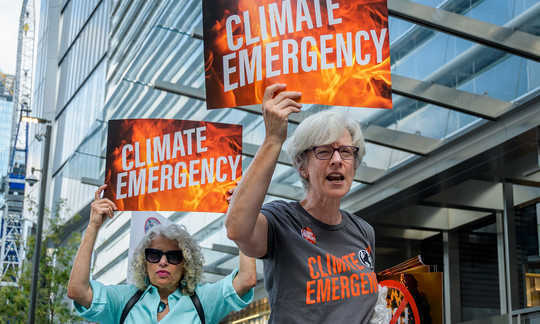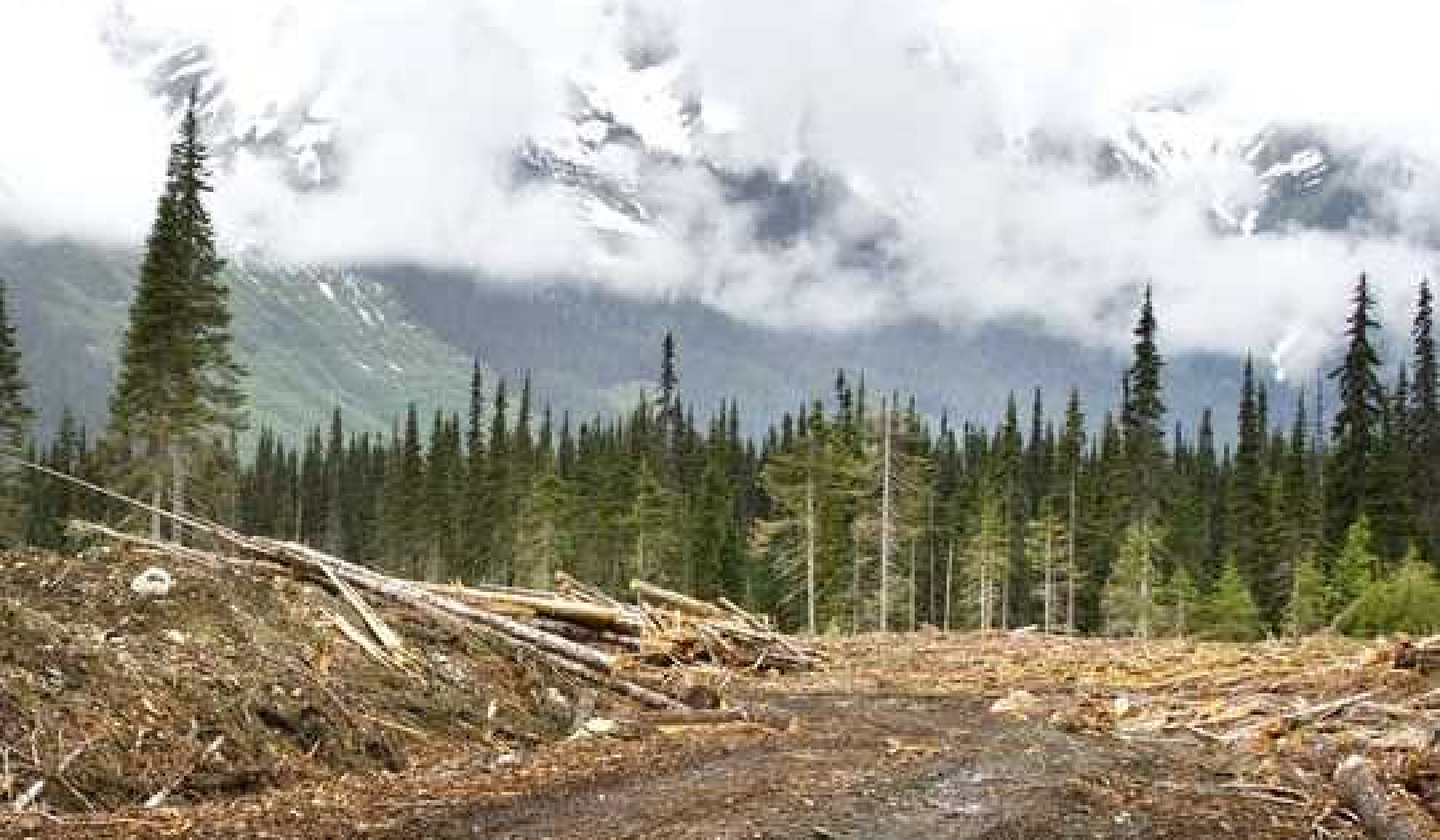
Women’s leadership won’t be a panacea for the overwhelming whiteness of climate leadership, but it’s a starting place.
On the back of a horse outside of Yellowstone National Park in August, I cracked a joke with a friend next to me: “I’m gonna let you finish about your Ph.D. and book tour there,” I ribbed her. “But you’ll need to make space for the voices that really matter here. You know, the voices of apolitical, middling, literary White men with big feelings.”
With grim laughter, rolled eyes, and more than a few expletives, we commiserated on the miserable lens that so many male writers and editorial gatekeepers use to frame climate change in the public eye. Examples of this problematic, patriarchal frame in climate storytelling are ubiquitous: men debating the meaning of words, men explaining ennui on a boat, or men succumbing to feelings of despair. These men and their words literally circumscribe the public’s moral imagination of the future we are choosing to leave for our children. Their stories limit our collective understanding of the world.
I was in Montana to join a summit of women leading on climate change and, over a few days in relationship over the back of a horse, on a kayak in Yellowstone River, or in working sessions together, we convened on the state and nature of feminist climate leadership. And, boy howdy, did we have a lot to say and a great deal of tears to cry.
There are very few places, professionally or personally, that many of us can go to be fully seen and held in the grief and wounding that comes with this work. We are often islands, weeping at keyboards, seething in rage, biting our tongues. We chew and swallow the grief and violation being done to our Earth and its people every day, and it is a bitter pill. So, to be in community with other women, where some of those scales fall in front of each other was, in some moments, transformative.
As I said my goodbyes to my sisters and colleagues, one thing was clear: women’s leadership on climate change is vital. Let me unpack it for you, so we properly understand the task at hand.
Vast webs of influence across global energy, finance, and political leadership prevent meaningful action on climate change. These fossil fuel companies, and the web of profiteering and exploitation connected to them, are the most powerful economic and political entities that have ever existed on the planet. They represent the most entrenched and violent oligarchs on the planet. And these entities are run by and for White men and their power.
Consolidated power in White men’s leadership dominates all sides of this problem. Men in science, men in politics, men in business, men in finance, men in nonprofits, men in the media, men in newsrooms. Men, men, men. Even when men are on the “right side” of this issue, they are often transacting in unaccountable, narrow, or even abusive ways. Across platforms and professions, men are still the gatekeepers of power, able to obliterate the careers and accomplishments of women in public with a tweet, a boardroom whisper, or by simply staying silent as their female colleagues are doxxed, disrespected, and erased, or worse. Then, those same men unironically self-deputize in public as “champions of women.”
Vast webs of global influence prevent meaningful action on climate change.
This mythology of the White male savior solving the climate crisis with some kind of patented technology is so prevalent that it’s actually a trope. Consider the recent film Ice on Fire, produced by Leonardo DiCaprio, which featured 20 White men, 10 White women, and one Black man talking about climate solutions like trees and algae. Meanwhile, b-roll footage unraveled of hundreds of people of color from the global south being essentially “saved” by such solutions. Congratulations, people of color and poor folks around the world, White guys with carbon capture technology are here to save you!
The narrowness and unaccountability of climate leadership and storytelling norms exist in stark contrast to what is actually necessary to address the nature of the crisis at hand. Because what is needed now is the comprehensive deconstruction of the profit model and attendant webs of power woven by the fossil fuel industry and its subsidiaries. And because we are not at war with the Earth itself, we must also reimagine our relationship with the planet and each other. How we care for one another, and for the land and oceans of our homes, will determine the nature, both good and bad, of near-term and long-term outcomes on the ground.
When unpacking the systems of harm around climate change, we reveal violation upon violation upon violation, like layers around an onion—and a feminist, anti-racist intersectional lens is necessary to understand these interconnected systems of harm. Because what we are really trying to do is root out and reveal how the pain and suffering of certain people is erased and dismissed, while the pain and violation of others takes center stage. This is the lens of moral attention—and it is foundational for global climate leadership.
For my part, I do not view “women’s leadership” as a panacea for addressing the systemic root of bankrupt leadership, because of the unholy alliances among White feminism, white supremacy, and colonialism. This is not an original thought. Indeed, as a White woman, I have been granted access into White spaces of leadership and prominence by way of my skin color, not my talent. Often, the way White women build power—which is one of the ways I have negotiated my own career—is to attach to and align with the power of specific White men. You know, the good ones, we tell ourselves. We are complicit to get a seat at that table, where, we tell ourselves, we can do some good.
One of the hardest pieces about the struggle within White-led feminist leadership is that, even in the center of the movement, we are still not fully divested from the leadership and currency of White male power. We still whisper our truths outside those rooms. We are still waiting at the window side for freedom, believing that if we simply ask nicely enough, long enough, the window will open. We jibe and tack across these headwinds of white supremacy and patriarchy, to just stand on the ground beneath our feet.
The solution is comprehensive divestment from patriarchy and White colonial supremacy.
Moreover, we are dishonest with ourselves about it. Such men, and the alliances that many White women have used to gain power and access, were present as specters in the rooms among us in Montana. They are the axes of power that we have the privilege to rotate around. We tell ourselves that it is worth it to supplicate to get a seat at the table—and this is the biggest lie of all. Because, in truth, we are only violated further, at higher levels, in more damaging ways, from these alliances. And, moreover, we White women are complicit in the continued violation of our colleagues and sisters who are Black, Indigenous, and other women of color. The power we gain from supplication is a poison pill. The solution is comprehensive divestment from patriarchy and White colonial supremacy.
Here is the thing about feminist leadership: it is gut-wrenchingly hard. Do not be fooled, this is not kumbaya woo-woo, and hand-holding. Rather, it is the deep work of reconciliation, justice, and accountability. For me, the kind of courage that it takes to confront the entrenched power of the fossil fuel industry is the same kind of courage and moral lens that it takes to dismantle my alliances with White male power. It is the exact same thing, with the same profile of retaliation and risks to physical, bodily, economic, and public harm.
Maybe what we were doing, in Montana and other spaces of feminist leadership as well, was cultivating our own bravery and our ability to see one another. Maybe it was reckoning with our complicity. Maybe it was birthing new levels of internal and external accountability. And maybe, downstream, these collective steps on the path will change the world for the better, as we firmly knit ourselves into the long arc of the struggle for justice for life itself on this finite and fragile planet. That hope is my North Star as I cross these rough and warming waters.
About The Author
Sarah Myhre, Ph.D., wrote this article for YES! Magazine. Sarah is a scientist, writer, and climate leader. She is the executive director of Rowan Institute, a nonprofit think tank focused on leadership in a hot, dangerous, and climate-changed world. Follow her on Twitter @SarahEMyhre.
This article originally appeared on YES! Magazine
Related Books
Climate Leviathan: A Political Theory of Our Planetary Future
by Joel Wainwright and Geoff Mann How climate change will affect our political theory—for better and worse. Despite the science and the summits, leading capitalist states have not achieved anything close to an adequate level of carbon mitigation. There is now simply no way to prevent the planet breaching the threshold of two degrees Celsius set by the Intergovernmental Panel on Climate Change. What are the likely political and economic outcomes of this? Where is the overheating world heading? Available On Amazon
How climate change will affect our political theory—for better and worse. Despite the science and the summits, leading capitalist states have not achieved anything close to an adequate level of carbon mitigation. There is now simply no way to prevent the planet breaching the threshold of two degrees Celsius set by the Intergovernmental Panel on Climate Change. What are the likely political and economic outcomes of this? Where is the overheating world heading? Available On Amazon
Upheaval: Turning Points for Nations in Crisis
by Jared Diamond Adding a psychological dimension to the in-depth history, geography, biology, and anthropology that mark all of Diamond's books, Upheaval reveals factors influencing how both whole nations and individual people can respond to big challenges. The result is a book epic in scope, but also his most personal book yet. Available On Amazon
Adding a psychological dimension to the in-depth history, geography, biology, and anthropology that mark all of Diamond's books, Upheaval reveals factors influencing how both whole nations and individual people can respond to big challenges. The result is a book epic in scope, but also his most personal book yet. Available On Amazon
Global Commons, Domestic Decisions: The Comparative Politics of Climate Change
by Kathryn Harrison et al Comparative case studies and analyses of the influence of domestic politics on countries' climate change policies and Kyoto ratification decisions. Climate change represents a “tragedy of the commons” on a global scale, requiring the cooperation of nations that do not necessarily put the Earth's well-being above their own national interests. And yet international efforts to address global warming have met with some success; the Kyoto Protocol, in which industrialized countries committed to reducing their collective emissions, took effect in 2005 (although without the participation of the United States). Available On Amazon
Comparative case studies and analyses of the influence of domestic politics on countries' climate change policies and Kyoto ratification decisions. Climate change represents a “tragedy of the commons” on a global scale, requiring the cooperation of nations that do not necessarily put the Earth's well-being above their own national interests. And yet international efforts to address global warming have met with some success; the Kyoto Protocol, in which industrialized countries committed to reducing their collective emissions, took effect in 2005 (although without the participation of the United States). Available On Amazon
From The Publisher:
Purchases on Amazon go to defray the cost of bringing you InnerSelf.comelf.com, MightyNatural.com, and ClimateImpactNews.com at no cost and without advertisers that track your browsing habits. Even if you click on a link but don't buy these selected products, anything else you buy in that same visit on Amazon pays us a small commission. There is no additional cost to you, so please contribute to the effort. You can also use this link to use to Amazon at any time so you can help support our efforts.
























